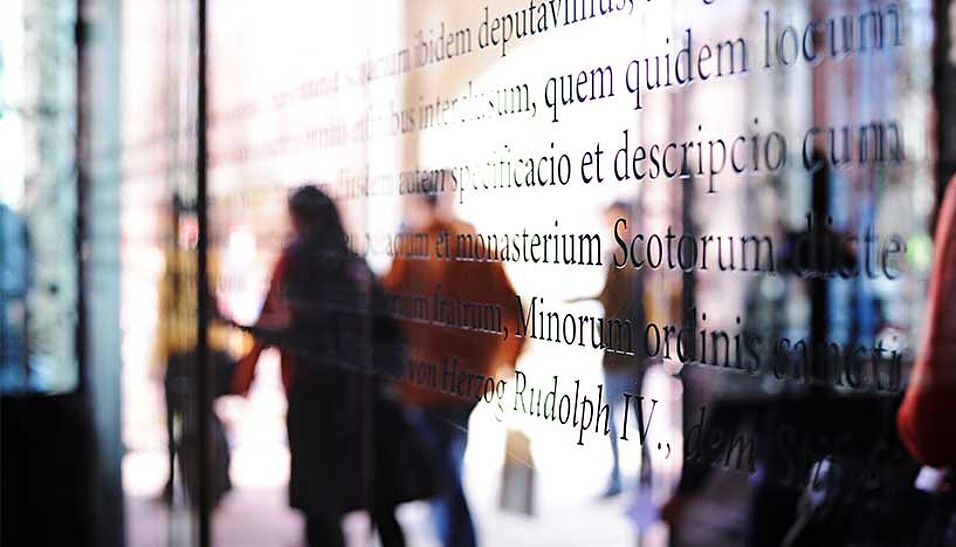Die Österreichische Akademie der Wissenschaften vergibt jährlich Stipendien an hervorragende NachwuchswissenschafterInnen. Dazu zählen auch die Doc und Doc-Team Stipendien. 16 DoktorandInnen der Universität Wien waren bei der Bewerbungsrunde 2013 erfolgreich und traten im Jänner 2014 ihr Stipendium an. Im Rahmen eines feierlichen Festakts wurden die Stipendien am 7. März 2014 von Bundesminister Reinhold Mitterlehner und ÖAW-Vizepräsident Michael Alram vergeben.
Wir gratulieren den StipendiatInnen zu dieser Auszeichnung!
- Sabine Monika Bauer, Institut für Kultur- und Sozialanthropoligie,
After the Arab Spring: Young Egyptian Intellectuals between Self-Expressions and Demands of their Rights [DOC]
- Hanna Brinkmann, Institut für Kunstgeschichte,
The Cultural Eye. Eine empirische Studie zur kulturellen Bedingtheit von Kunstbetrachtung [DOC-team]
- Wolfgang Ernst, Institut für Neutestamentliche Wissenschaft,
Die Didache im Kontext. Die Gemeinden der Didache auf dem Hintergrund antiker Vereinigungen und jüdischer Synagogen [DOC]
- Vera Faber, Institut für Slawistik,
Die ukrainische Avantgarde und Russland. Zur Wechselwirkung von Zentrum und Peripherie [DOC]
- Christina Marie-Charlotte Hoffmann, Institut für Europäische und Vergleichende Sprach- und Literaturwissenschaft,
Dekadenz und Zionismus [DOC]
- Katharina Hövelmann, Institut für Kunstgeschichte,
Bauhaus in Wien? Möbeldesign und Innenraumgestaltung der Ateliergemeinschaft Friedl Dicker und Franz Singer [DOC]
- Rosa John, Institut für Theater, Film- und Medienwissenschaft,
Material denken. Die kinematografische Apparatur und die Praktiken der Avantgarde [DOC-team]
- Felix Kernbichler, Institut für Zivilrecht,
Vertragsauflösungssperre in der Insolvenz [DOC]
- Eva Kössner, Institut für Kultur- und Sozialanthropologie,
Erinnern in transnationalen Lebenswelten: Junge palästinensische MigrantInnen und ihre Erinnerungen an den Oslo-Prozess [DOC]
- Stefan Meingast, Institut für Astrophysik,
From Dark Clouds to Bright Clusters [DOC]
- Catherine Brooke Penaloza Patzak, Institut für Geschichte,
Implementing Anthropology: The Institutional Circulation of Scientists and Ethnographic Objects Between North America, Austria and Germany, 1873-1933 [DOC]
- Maria Schreiber, Institut für Publizistik- und Kommunikationswissenschaft, Bild 2.0. Generationsspezifische fotografische Bildpraktiken im digitalen Zeitalter [DOC-team]
- Markus Steenbock, Institut für Mathematik,
A Systematic Study of Algebraic Properties of Random Groups [DOC]
- Eleni Theodorou, Institut für Alte Geschichte und Altertumskunde, Papyrologie und Epigraphik, Das Amt des Agoranomos in der griechischen Welt während der römischen Kaiserzeit [DOC]
- Daniel Tiemeyer, Institut für Musikwissenschaft,
Klang als dramatisches Ausdrucksmittel in den Opern Franz Schrekers [DOC]
- Anna Katharina Windisch, Institut für Theater-, Film- und Medienwissenschaft,
Cultural Exchanges and Transnational Encounters. A Comparative Study of Audiovisual Performance Practices in Austria and the United States during the Silent Film Era [DOC]

